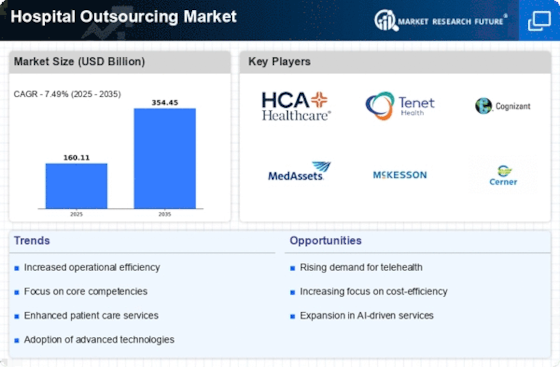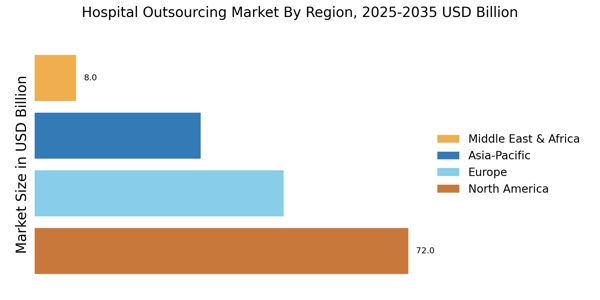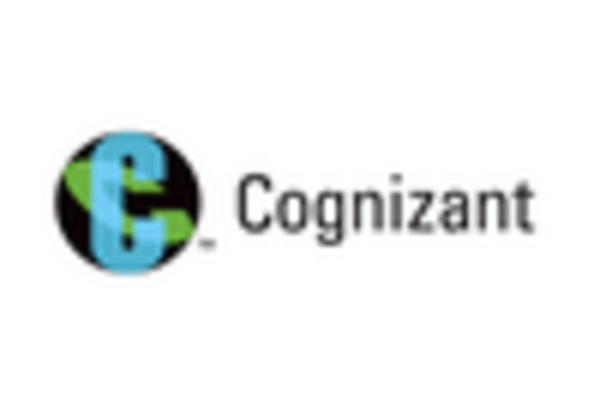Regulatory Compliance
The Hospital Outsourcing Market is significantly influenced by the increasing complexity of regulatory compliance. Healthcare organizations are required to adhere to a myriad of regulations, which can be both time-consuming and costly. Outsourcing certain functions, such as billing and coding, allows hospitals to leverage specialized expertise in navigating these regulations. This not only ensures compliance but also mitigates the risk of costly penalties associated with non-compliance. The market for outsourced compliance services is projected to grow, as hospitals recognize the importance of maintaining regulatory standards while focusing on core healthcare services. As regulations evolve, the demand for outsourcing compliance-related functions is likely to rise, further shaping the landscape of the Hospital Outsourcing Market.
Rising Operational Costs
The Hospital Outsourcing Market is experiencing a notable increase in operational costs, compelling healthcare providers to seek cost-effective solutions. As hospitals face rising expenses related to staffing, equipment, and technology, outsourcing non-core functions appears to be a viable strategy. Reports indicate that outsourcing can reduce operational costs by up to 30%, allowing hospitals to allocate resources more efficiently. This trend is particularly evident in administrative services, where outsourcing has become a common practice. By leveraging external expertise, hospitals can streamline operations and focus on patient care, thereby enhancing overall service delivery. The financial pressures faced by healthcare institutions are likely to continue driving the demand for outsourcing solutions, as they strive to maintain profitability while ensuring high-quality care.
Technological Advancements
Technological advancements are playing a crucial role in shaping the Hospital Outsourcing Market. The integration of innovative technologies, such as artificial intelligence and data analytics, is enabling hospitals to optimize their operations through outsourcing. These technologies facilitate more efficient management of outsourced services, allowing for real-time monitoring and improved decision-making. As hospitals increasingly adopt these technologies, the demand for outsourcing partners that can provide advanced technological solutions is likely to rise. Furthermore, the ability to leverage technology in outsourced functions can lead to enhanced service delivery and operational efficiency. The ongoing evolution of technology in healthcare suggests that the Hospital Outsourcing Market will continue to expand as hospitals seek to harness these advancements for better patient care.
Focus on Patient Experience
Enhancing patient experience has become a pivotal focus within the Hospital Outsourcing Market. As healthcare providers strive to improve patient satisfaction, outsourcing certain services, such as telehealth and patient engagement, has emerged as a strategic approach. By utilizing specialized outsourcing partners, hospitals can offer more personalized and efficient services, which can lead to improved patient outcomes. Data suggests that hospitals that prioritize patient experience through outsourcing can see a significant increase in patient retention and referrals. This trend is likely to continue, as healthcare organizations recognize the competitive advantage that a superior patient experience can provide. Consequently, the demand for outsourcing services that enhance patient interaction and satisfaction is expected to grow within the Hospital Outsourcing Market.
Increased Demand for Specialized Services
The Hospital Outsourcing Market is witnessing a growing demand for specialized services, driven by the need for expertise in various healthcare domains. As hospitals aim to provide high-quality care, they are increasingly outsourcing specialized functions such as radiology, pathology, and laboratory services. This trend allows healthcare providers to access top-tier professionals and advanced technologies without the burden of maintaining in-house capabilities. Market data indicates that the outsourcing of specialized services is projected to grow significantly, as hospitals recognize the benefits of tapping into external expertise. This shift not only enhances service quality but also enables hospitals to remain competitive in an evolving healthcare landscape. The increasing reliance on specialized outsourcing is likely to shape the future of the Hospital Outsourcing Market.

















